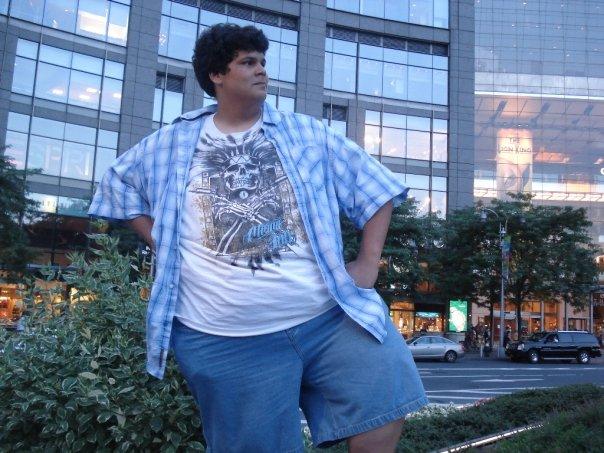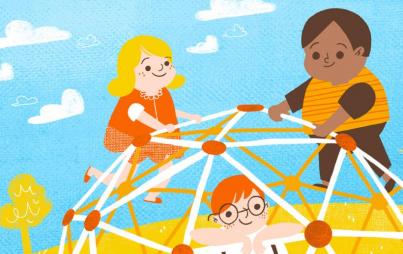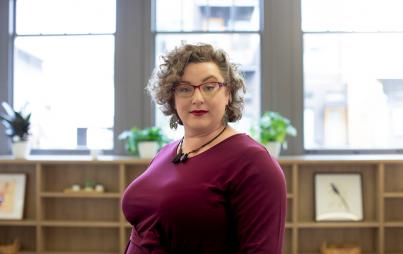
16-year-old, 500-pound me. Image: supplied.
“Being thin won’t 'fix' you, because you're not broken.”
One of the most dangerous aspects of positive change is our tendency to demonize the people we used to be.
I don’t know a single person who hasn’t lain awake in bed, plagued with the thoughts of a cringe-worthy move they made in their younger years, or some kind of toxic behavior they exhibited before they knew better.
It’s a natural part of life: On our endless journey to become stronger and wiser people, we’ll eventually view our pasts through the lenses of what we’ve learned. Sometimes, we'll develop resentment toward how ignorant or naive we used to be.
I’m 270 pounds thinner than I was at age 16, when I weighed nearly 500 pounds (497, to be exact.)
Here are 5 things I wish I could tell my 500-pound self:
1. “Losing weight isn’t going to solve your problems.”
We have a tendency to fixate on the things that we see as our biggest obstacle. This is especially true at a younger age, when we generally feel helpless about most aspects of our lives.
However, while weight loss will help your self-confidence to a certain degree, it won’t solve all of your problems.
Generally speaking, your issues are more deeply-rooted than just your appearance — being thinner won’t heal your social anxiety or depression, make women like you more, or convince your bullies you're worthy of respect (more on that later).
Seek weight loss for your own various healthy reasons — not as some sort of cure-all to unrelated issues.
2. “Binge Eating Disorder is totally a thing, and you’re living with it.”
A strange side effect of being a person is an inability to add context to the things we’re going through sometimes: There’s really no easy way to know whether something you’re experiencing is an isolated incident, or something millions deal with.
This is especially true with eating disorders, as our behavior with food is such an automatic and essential part of day-to-day life.
Know that it’s OK to discover you have an eating disorder — even if men are known to have them less frequently, and even if your disorder is among the least medically researched.
Be gentle with your body in the time after you learn your eating has been disordered, and know that recovery is a lifelong path with bumps, obstacles, and missteps.
It does usually get better with time.
3. “Your bullies don’t 'just want the best for you.' They want to keep you down.”
Nobody wants to think people are bad. Nobody wants to think people would hurt others for no good reason.
Because of this, it’s easy to try and rationalize the behavior of bullies. Over time, you’ll begin to tell yourself that their insults have a point — which will only be exacerbated by their claims, once you start losing weight, that they “did it to help you.”
This is, quite simply, bullshit.
It’ll take a long time, but you’ll notice how their behavior always has to do with shaming you, even when they seem to be on your side.
They’ll criticize your clothing, your haircut, your behavior at parties — and once you change all these things to appease them, they’ll say, “You aren’t the guy I became friends with anymore.”
These toxic people will eat away at your self-esteem until you kick them out of your life.
You don’t need to hurt them or even wish bad things upon them; you just need them far away from you.
Judging your own self-worth by the opinions of others will always lead to you feeling unhappy. The only way to win is to stop playing their game.
4. “The temptation to give up is your only real obstacle.”
This is in no way specific to losing weight — it's applicable to everything you’ll pursue in your life. You’re not going to be good at everything on the first try. In fact, you’re basically going to suck at most things for a long time before you start making any progress.
As challenging as your goals may seem, your only real obstacle is the temptation to give up.
When you make a mistake, own up to it and address it — but do so without being too hard on yourself. We’re all our own toughest critics, and discouragement is the quickest path to giving up.
Learn from your slip-ups and treat yourself with kindness; then pick yourself back up and continue moving forward.
5. “Being thin won’t 'fix' you, because you're not broken.”
Among the things I wish 16-year-old, 500-pound, terrible-haircut-sporting Matt Diaz could hear, this is the most important.
Being thin won't 'fix' you, because you're not broken.
You have a lot of problems. Your views on sex are closed-minded, your anti-feminist mentality is problematic at best, and you think you know way more than you actually know.
At the same time, though, you’re a kid. This is the perfect time to be kind of a dipshit, and these are all issues that will be ironed out in time.
Your size doesn’t make you “ugly,” or “wrong,” or “bad.”
No matter who tries to tell you otherwise, you have so much value and so many things to offer the world as you are. Your journey to losing weight is one that will make you happier, wiser, and stronger, but those are qualities that have always lived inside of you. They’re a result of the dedication and hard work you’ve exhibited, not just in being half the size you used to.
Treat your journey as a path to becoming better, while knowing you’re wonderful as you are.
The person you are was forged through a million decisions and experiences, and there’s great beauty in that. Let the changes come with the knowledge you gain — never let the person you are hate the person you’ve been.








